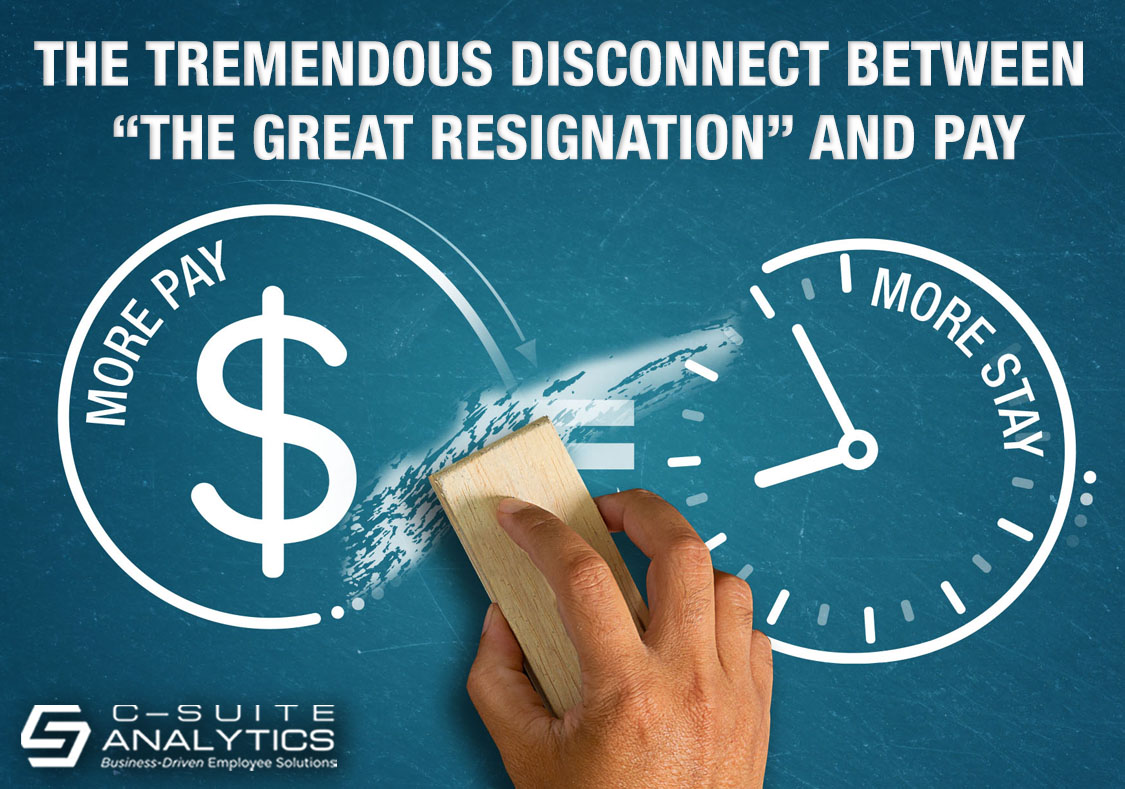At SHRM Talent Conference 2024 I asked the room this question: Who here has ever heard of one manager getting fired for a low employee engagement survey score? Please raise your hand if you can think of even just one. The only sound was the 400-plus attendees turning in their seats to see if anyone raised their hands. There were no hands up.
The Tremendous Disconnect Between “The Great Resignation” and Pay

You might want to share this report with your managers.
Companies’ most frequent response to “The Great Resignation” is to raise pay. In fact, average increases rose from 2.6% to 3% during 2021 and are scheduled to raise to 4% during 2022.[i] These small-looking percentages disguise how many dollars they represent among corporations and within our economy as the total jump in percentage increases, they represent equals 54%.
Let’s consult other data, then, to better understand why all of this cash is having so little impact on the number of employees who are quitting their jobs. In last week’s blog I presented evidence from a very current MIT study that said pay ranked 16th among reasons why employees are quitting during “The Great Resignation”.[ii] The top five reasons are:
- Toxic corporate culture
- Job insecurity and reorganization
- High levels of innovation
- Failure to recognize employee performance
- Poor response to COVID-19
So there are ten additional quit reasons between these five and reason #16 which is pay. How can that be?
Let me present three possible reasons, starting with the most obvious one.
First, employees aren’t motivated to change jobs for pay alone. Pay…or the worthless phrase “better opportunity”…might be what they tell us in exit surveys or they say to their manager, all to avoid deeper discussions about the real reasons why they initially looked for a different job. Pay is also the go-to quit explanation for some high-turnover managers who seek an out, who have to say something to clear them from turnover responsibility. Looking beyond the MIT study, every scientific study I’ve read over decades about why employees quit placed pay no higher than number four.
Second, pay means much more when looking for a job than when considering leaving a job. Employees who’ve worked a job for months or years have deep relationships with their boss and colleagues, know every detail of their daily job duties, and have adjusted to the job’s schedule and commute…making pay just one detail in the full stew of their job. Job seekers, on the other hand, know relatively little about the relationships, duties, and other factors of a job for which they’ve sat for one or two interviews, maybe via zoom. So pay for them matters more. When choosing between two jobs, applicants might weigh heavily that one pays a dollar an hour more. But when current employees leave a job for that same amount, I’d bet my house they are leaving for more reasons than pay.
The third reason requires pulling in some data recently reported here, to carve a path through unique trends during “The Great Resignation”. Consider these three findings:
- Pay ranks #16 among reasons why employees are quitting as noted above.
- Millennials and Gen Z employees are just beginning to quit their jobs with many more exits to come, as I reported before.
- And I also shared the reporting that the number of entrepreneurs has increased during this period by 24%.
Lest we think millennials and Gen Z represent a small group of workers, they currently comprise more than half of all U.S. employees and millennials alone will make up 75% of our workforce by 2025. Yet because they are younger, societal impacts from #MeToo and George Floyd’s murder have influenced them more because they’ve experienced less life. And those events have had a profound impact on “The Great Resignation” because Americans’ response to each event is we just raised our personal standards and there are some things we won’t tolerate anymore. And that’s where “Toxic corporate culture” comes in. Our worker’s tolerance for bad bosses, tough schedules, and even dressing for and commuting to work has hit a wall.
Besides, young workers can more easily quit their jobs and begin an entrepreneurial business because they don’t have to replace as much money as a 50-year-old would have to replace. We’ve all waited for a restaurant table while seeing several empty tables in clear view. Why can’t restaurants find workers? They had an abundance of them in 2019 and then laid them off in 2020. Those workers took online courses/drove for Uber/became dog-sitters and now they aren’t coming back. Who wants to revert back to working nights/weekends/holidays when those workers could literally replace the low wages they were making by dog-sitting for their friends?
But “The Great Resignation” isn’t just about restaurant workers. That same MIT study said blue-collar and white-collar workers are quitting at an equal rate. The bottom line is the pandemic caused many of us to take time out and rethink all aspects of our lives including work. And many of us learned life is short.
The pathway to winning talent during “The Great Resignation” then becomes clear:
- Get as flexible as you can regarding schedules, commutes, and virtual work.
- Recall that what matters most is what employees talk about over dinner…and as said before here what employees talk about over dinner is bosses/colleagues/duties, all of which are triggered by their immediate supervisor.
- Knowing this, implement Stay Interviews so those supervisors learn what each employee really wants versus what you assume or what reports like this tell you.
- Hold supervisors accountable to retention goals because retention starts with them…and the flexibility you must install will make supervisors’ employee connections even more difficult.
- Pay employees fairly so they don’t feel ripped off as even employees know raises are more about recognition than improving one’s lifestyle.
Winning requires following the data trail versus trudging blindly down the path of sheep-like companies that think “The Great Resignation” is all about pay.
What strategies for retaining employees work best? Schedule a Retention Strategy Session with me at DFinnegan@C-SuiteAnalytics.com for a free consultation. We will share with you what has worked for companies just like yours to cut turnover by 30% and more even during “The Great Resignation”.
[i] https://www.shrm.org/resourcesandtools/hr-topics/compensation/pages/revised-2022-salary-increase-budgets.aspx
[ii] https://sloanreview.mit.edu/article/toxic-culture-is-driving-the-great-resignation/



